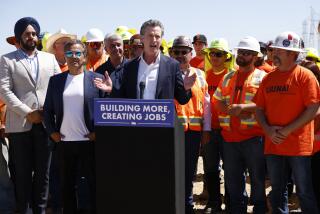Debt May Cloud Clinton’s Vision for Public Works
- Share via
WASHINGTON — Although President-elect Bill Clinton pledged in his campaign to spend as much as $80 billion over four years to rebuild and improve the nation’s public works, key advisers say that they now think he is likely to present a substantially scaled-down plan to Congress this month.
In recent weeks, Clinton staff members, advisers and technical experts have sorted through an array of possible capital investments in roads, bridges, transit lines, aviation, water treatment and communication systems to bolster long-term U.S. competitiveness and stimulate future economic development. Although the proposal has been among Clinton’s chief themes, it appears to be losing ground in the tough choices among spending priorities.
When the program for investment in public works and technology research is unveiled, “I would think it would be a lot less” than the $20-billion-a-year spending plan Clinton cited in his campaign policy agenda, said one transition team source. “I think that the investment program may be taking a back seat” to other budget needs, including deficit reduction, the source said.
Another Clinton adviser said: “I think there’s going to be less available for everything than people had hoped.”
The aides stressed that their prediction is based on their own assessments and noted that no decision has been made by Clinton, who is known for delaying tough choices and occasionally going against even well-researched advice from his aides.
The President-elect has summoned his chief economic counselors to Little Rock, Ark., Thursday to review the final options on his plan to reinvigorate the economy. Clinton has pledged to make the decisions on his proposal by a self-imposed deadline of Inauguration Day.
Among those expected at the meeting are Lloyd Bentsen, nominee for Treasury secretary, and Rep. Leon E. Panetta (D-Carmel Valley), who will be Clinton’s budget director.
Although Clinton is expected to have to scale back some proposals because of budget realities, a serious reduction in public works and technology research would raise doubts about the revival plan Clinton outlines for the nation’s economy--and the central theme of his campaign.
Among those most likely to be disappointed if the plan falls short of expectations is a coalition of urban and transportation interests that has urged major new spending on highways, bridges and mass transit systems. Included in the group are the politically powerful National Governors Assn., the U.S. Conference of Mayors, the American Assn. of State Highway and Transportation Officials and the American Road and Transportation Builders Assn., which represents the construction industry.
The state highway and transportation group recently said that federal, state and local governments together should be spending nearly $75 billion a year on highways and bridges alone if the nation’s transportation needs are to be met.
Members of Clinton’s transition team last month presented the President-elect with options for investment that, according to one source, ranged from a plan with no new spending to one proposing up to $80 billion in additional money over five years. Even the most expensive option would fall short of Clinton’s proposal, outlined in his campaign book, “Putting People First.” It recommended putting $20 billion a year into a “Rebuild America Fund” to pay for investments in transportation systems, new environmental and informational technologies, and conversion of defense industries to civilian products.
The option calling for no new spending includes administrative changes intended to streamline government operations and speed project construction.
At the very least, Clinton is expected to ask Congress to pump an additional $3.8 billion this year into the Intermodal Surface Transportation Efficiency Act of 1991, which drastically reorganized federal transportation aid programs and gave states and local governments greater authority to spend highway aid on transit systems.
The bill authorized spending of $151 billion through the 1996 fiscal year. But this year, Congress appropriated only 88% of the authorized funds for highways and only 70% for transit. Clinton is likely to ask Congress for the supplemental appropriation to fully fund the transportation act in fiscal 1993, which began Oct. 1, his advisers said.
In the longer term, two forces are pushing Clinton to scale back plans for major investments, the advisers said. One is a growing fear about the impact on the nation’s economy of the burgeoning federal budget deficit, which is projected to reach $341 billion this year.
“I think the deficit is worse than it appeared the last time that very careful attention was given to (it) by the governor and his advisers,” when they put together their initial economic program last June, one of the Clinton advisers said. “As it was, the $20-billion commitment in June was less than almost everyone wanted then.”
A second major concern is the belief that the federal government cannot spend $20 billion a year on public works without wasting a substantial part of the money. The principal problem is the time it takes to carefully identify those projects that would result in real increases in economic productivity, rather than make-work, one adviser said.
In addition, states and local governments, which have been hit hard by the recession, would be unlikely to have enough available matching funds.
More to Read
Sign up for Essential California
The most important California stories and recommendations in your inbox every morning.
You may occasionally receive promotional content from the Los Angeles Times.












